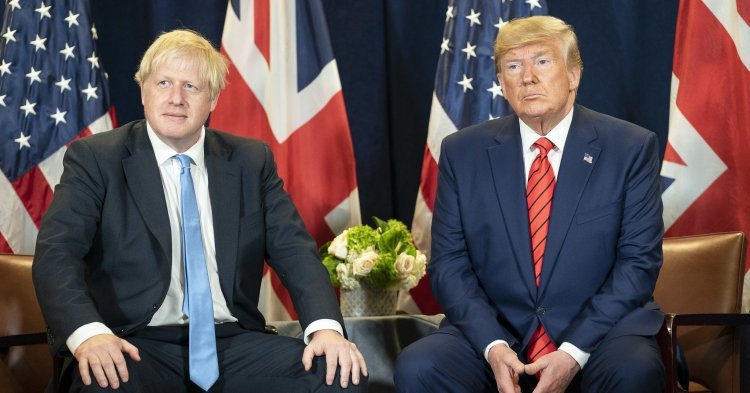American society is in tatters. With Trump’s statement that he may send in the military to deal with the protests, America is on the brink of war against its own people. With President Trump’s decision to clear protestors from outside the White House for a photo opportunity, America briefly resembled the cult-like dictatorship of Pyongyang.
For Trump, it is beyond comprehension that asserting the strongman image is not a solution to everything. What would now be required of a true leader would be to listen to protestors, understand their frustration, acknowledge the deep and terrible injustices it stems from, and seek positive change through engaging in dialogue. But Trump can’t face dialogue; he fears being perceived as weak. Instead, he seeks simple solutions, wanting to paint a picture of himself as authoritative and no-nonsense; withdraw from the Iran nuclear deal, cut funding to the WHO, withdraw from the Open Skies agreement, use military force. All of these would or are already having catastrophic consequences. In a world where we badly need patience and empathy to tackle difficult, painful, deep-rooted problems, the flimsy rage of the fragile male egos which govern too many of our societies is like fuel on a fire.
This flammability has much to do with populism, but it is also a question of gender. Empirical studies such as this one, published in the Harvard Business Review, partly confirm our stereotypes: women have more “nurturing” competences on average. Women and men do tend to vary in terms of leadership style: women are more commonly “transformational” leaders, placing the emphasis on collaboration with the team, while men are more often more dominant, “transactional” leaders, focussing more on results. What is ironic given our socialised expectation that men are more natural leaders because of their more top-down leadership styles is that these “nurturing” competencies serve women well in leadership roles; although they are less frequently elected or nominated, once in a leadership role, their relationship-building skills often make them effective leaders. Vastly different from Trump, Boris Johnson, Jair Bolsanaro and others, women are very unlikely to latch on to a vision of leadership which is all about them.
Despite this, underlying societal biases lead us to accept excessive incompetence from bad male leaders. Of course women are not infallibly competent. The difference is that incompetent women are mostly not in charge of entire countries. Women are subjected to intense gender stereotyping in most areas of their lives, but this is especially true in politics. Responsibility, decisions, power – these are all things that, from a young age, we taught to associate with men. When we find them in the hands of a woman, our reaction is firstly to question it, then hold her to a higher standard. When I mention my boss while describing my job to my peers, a huge majority of them continue the conversation saying “he”, assuming – implicitly and incorrectly – that anyone in charge of a research group must be a man. In the German media, 78% of expert figures invited to discuss coronavirus so far have been men – reinforcing our worldview that knowledge is male. Women in politics have to overcome these prejudices and then some to be elected.
That is not to say that all of them are good. Theresa May was a bad leader by any standards (except the abysmal low bar of today’s politicians in Britain – possibly one of the reasons she made it into Number 10 in the first place). But when the negotiations became difficult, she kept going back to the negotiation table, determined to find a compromise between irreconcilable positions. She twice carried out the undoubtedly rather humiliating job of asking for an extension to avoid a no-deal Brexit.
Boris Johnson, on the other hand, places bravado above all else. No matter that no-deal Brexit would be a disaster for British society, especially the most vulnerable: for him, there is a macabre glory in enacting something which almost everyone has accepted as very stupid. Striking a not-too-dissimilar tone, Jair Bolsanaro claimed that we “need to fight coronavirus like a man” by carrying on as usual, playing down real risks as if, by pretending they did not exist, they would leave us alone.
The fragile male ego at the helm is an expert at making a show of boldly taking something on the chin when he is sure that it is others who will take the hit. Johnson, wrapped in a bubble of privilege, won’t suffer from Brexit. Bolsanaro, a healthy 65-year-old with access to excellent medical care, would be unlikely to suffer badly from coronavirus, unlike the indigenous communities and poorer slums that he is sending to the slaughter. The theatre of presenting a strongman image at the expense of everything else is a very dangerous one, yet the fragility of the narrative – take Trump’s reluctance to wear a mask in public for fear of being seen to be afraid of the virus – is not far below the surface.
To be perfectly clear; of course female leaders are not de facto better than male ones; and of course there have been many, many excellent male leaders over the course of history. But a fragile male ego at the helm is a dangerous one. A fragile male ego at the helm is more likely to tolerate and instigate violence. A fragile male ego at the helm is almost incapable of backing down, even to save lives, in order to preserve his own image. Fragile male egos give us volatility where we need stability, distracting narratives where we need transparency, and a lack of attention to others when we badly need more understanding, more tolerance, more equality and more justice.
Our deep-rooted perceptions that power and responsibility are for men have lead us, for far too long, to consider bad male leaders to be more credible than they really are. The most recent deadly cocktail of Trump, racially-motivated police brutality and coronavirus should, more than ever before, teach us to be more careful who we vote for.


Follow the comments: |
|
